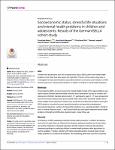Socioeconomic status, stressful life situations and mental health problems in children and adolescents: Results of the German BELLA cohort-study
Reiss, Franziska
Meyrose, Ann-Katrin
Otto, Christiane
Lampert, Thomas
Klasen, Fionna
Ravens-Sieberer, Ulrike
Aim
Children and adolescents with low socioeconomic status (SES) suffer from mental health problems more often than their peers with high SES. The aim of the current study was to investigate the direct and interactive association between commonly used indicators of SES and the exposure to stressful life situations in relation to children’s mental health problems.
Methods
The prospective BELLA cohort study is the mental health module of the representative, population-based German National Health Interview and Examination Survey for children and adolescents (KiGGS). Sample data include 2,111 participants (aged 7–17 years at baseline) from the first three measurement points (2003–2006, 2004–2007 and 2005–2008). Hierarchical multiple linear regression models were conducted to analyze associations among the SES indicators household income, parental education and parental unemployment (assessed at baseline), number of stressful life situations (e.g., parental accident, mental illness or severe financial crises; 1- and 2-year follow-ups) and parent-reported mental health problems (Strength and Difficulties Questionnaire; 2-year follow-up).
Results
All indicators of SES separately predicted mental health problems in children and adolescents at the 2-year follow-up. Stressful life situations (between baseline and 2-year follow-up) and the interaction of parental education and the number of stressful life situations remained significant in predicting children’s mental health problems after adjustment for control variables. Thereby, children with higher educated parents showed fewer mental health problems in a stressful life situation. No moderating effect was found for household income and parental employment. Overall, the detected effect sizes were small. Mental health problems at baseline were the best predictor for mental health problems two years later.
Conclusions
Children and adolescents with a low SES suffer from multiple stressful life situations and are exposed to a higher risk of developing mental health problems. The findings suggest that the reduction of socioeconomic inequalities and interventions for families with low parental education might help to reduce children’s mental health problems.
Dateien zu dieser Publikation

